[ad_1]
A kitchen store-room, an office that cannot be traced, a plaque and little else, a rented hall that was once a godown, the list goes on. Of as many as 16 centres for research — on subjects ranging from Ambedkar and Gandhi to yoga and cyber-security — that the five-year-old Mahatma Gandhi Central University (MGCU) in Motihari, Bihar, has launched. All in just 12 months and, that, too, during the pandemic lockdown, The Indian Express has found.
Barring two, none has the approval of statutory bodies, the Academic Council (AC) or Executive Council (EC), as is the norm.
MGCU was established through an Act of Parliament in 2014, it began functioning in 2016. It runs from a 25-acre campus and four rented premises; has 120 teachers and 1,300 students besides 350 research scholars.
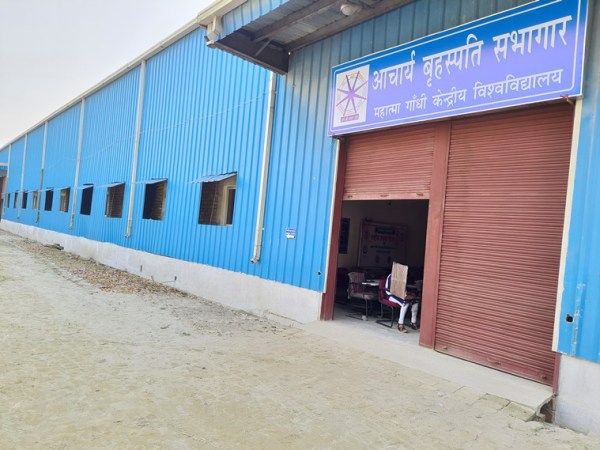 Front view of the library named after former PM AB Vajpayee opened in what used to be a godown. The library has a shutter for a door (since this was previously a godown).
Front view of the library named after former PM AB Vajpayee opened in what used to be a godown. The library has a shutter for a door (since this was previously a godown).
Most of these centres do not have designated faculty yet. The Indian Express found five being run from the office space of teachers appointed as centre coordinators. Three centres, inaugurated with much fanfare in October this year, were opened in small rooms with no facilities, not even furniture.
Some illustrative examples:
* A centre for public policy education named after Chhatrapati Shivaji was launched last month in an empty 10X10 feet room once used as a kitchen and storeroom. It has a designated coordinator and no faculty. When contacted, Asheesh Srivastava, Dean of the School of Education and the coordinator, said: “We aim at inter-disciplinary research and hence, no devoted faculty is required as of now.” Asked about the location and facilities, he said: “I can take only academic queries.”
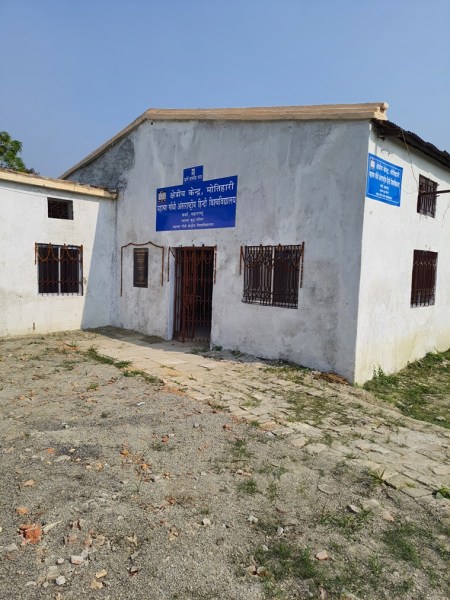 Another Centre recently opened by Motihari University. This room is empty inside (with no chairs either).
Another Centre recently opened by Motihari University. This room is empty inside (with no chairs either).
* Kashi Prasad Jaiswal Hindu Study Centre was inaugurated less than a month ago in a 14 X 10 feet room. It finds a mention on the website but the room is empty. There are no details on its objective or attached faculty. When contacted, its co-coordinator,Vishvesh, refused to comment.
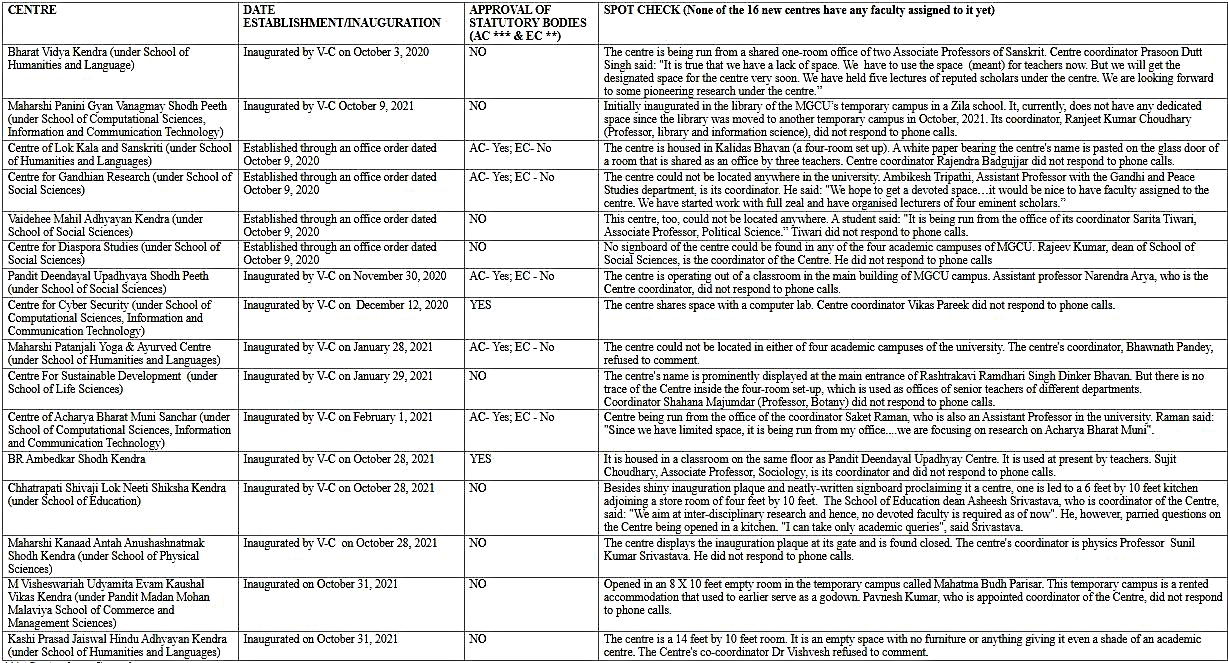 ***AC – Academic Council ; **EC – Executive Council (Click to view in full)
***AC – Academic Council ; **EC – Executive Council (Click to view in full)
* A shiny plaque is the only evidence of a small 8 X 10 feet room being a centre on skill development. The M Visheswariah Skill Development Centre, under the Pandit MMM School of Commerce and Management, was inaugurated on the same day as the Kashi Prasad Jaiswal Hindu Study Centre last month. Pavnesh Kumar, the dean of Pandit MMM School of Commerce and Management and coordinator of the Centre, did not respond to phone calls.
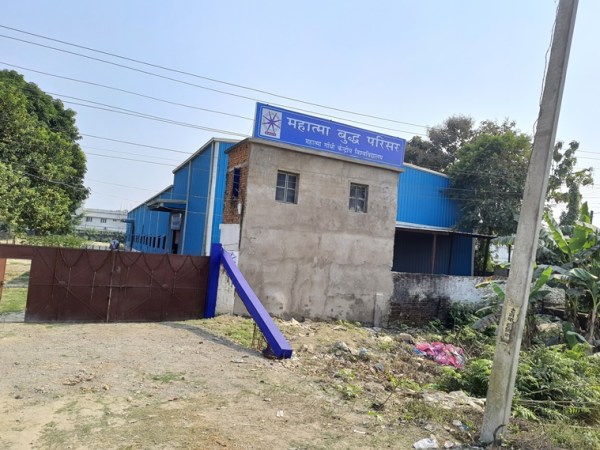 Recently-opened Mahatma Buddh Parisar is operating out of a rented space that measures 250 feet by 50 feet and was earlier used as a godown. This now houses an auditorium, a library named after former PM AB Vajpayee and classrooms for education and library sciences post-graduation courses. Four new centres are also opened in separate buildings in the same rented campus
Recently-opened Mahatma Buddh Parisar is operating out of a rented space that measures 250 feet by 50 feet and was earlier used as a godown. This now houses an auditorium, a library named after former PM AB Vajpayee and classrooms for education and library sciences post-graduation courses. Four new centres are also opened in separate buildings in the same rented campus
Given that MGCU is a new Central university, the above three are located in a temporary campus called the Mahatma Buddh Parisar, adjacent to the main campus and rented at Rs 4 lakh per month in October 2021. This temporary campus was once a godown.
* At least three new centres don’t even have a physical address: Maharshi Patanjali Yog Evam Ayurveda Adhyayan Kendra (Maharshi Patanjali Yoga and Ayurved Centre); Gandhi Shodh Kendra (Centre for Gandhian Research); and Pravasee Adhyayan Kendra (Centre for Diaspora Studies).
 A view of the godown that now houses an auditorium, a library named after former PM AB Vajpayee and classrooms for education and library sciences post-graduation courses.
A view of the godown that now houses an auditorium, a library named after former PM AB Vajpayee and classrooms for education and library sciences post-graduation courses.
While Bhawnath Pandey, coordinator of the centre named after Maharshi Patanjali, refused to comment, Rajeev Kumar, coordinator of the Pravasee Adhyayan Kendra did not respond to phone calls. Said Ambikesh Tripathi, in-charge of the Gandhi Shodh Kendra: “We hope to get a devoted space.it would be nice to have faculty assigned to the centre. We have started work with full zeal and have organised lecturers of four eminent scholars.”
* Then there are centres operating out of one-room offices of teachers appointed as coordinators. For instance, the Bharat Vidya Kendra, established under the School of Humanities and Language, runs out of a shared one-room office of two associate professors of Sanskrit.
Said its coordinator Prasoon Dutt Singh: “We will get the designated space for the very soon. We have held five lectures of reputed scholars under the centre.”
The centre of Acharya Bharat Muni Sanchar, under School of Computational Sciences, Information and Communication Technology, runs from the office of its coordinator, Saket Raman, an Assistant Professor. The Centre is focused on Bharatmuni, the sage who is considered to have authored Natya Shastra.
Two mails sent to Sanjeev Kumar Sharma, Vice-Chancellor, Mahatma Gandhi Central University, and to Proctor Pranveer Singh on November 17 and November 21, did not elicit a response.
A centre is meant to strengthen disciplinary programmes by providing interdisciplinary coursework, enabling research and external visibility for the university. It typically involves faculty and staff from one or more departments. “Establishing just one centre is a lot of work and can sometimes take up to a year. So how can a Central university manage to set up 16 in such a short span of time?” said the Vice-Chancellor of a Central university.
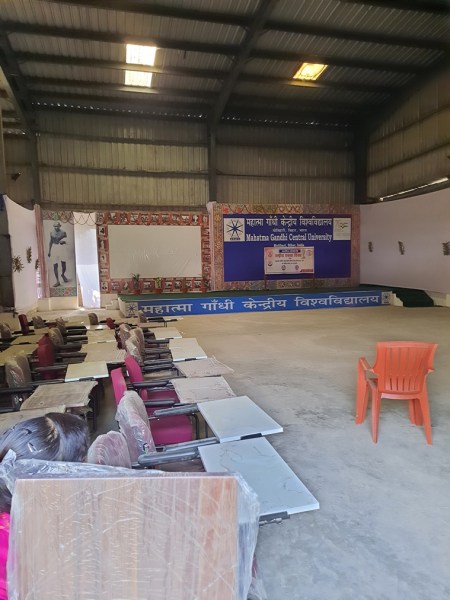 Inside view of the godown which now houses an auditorium
Inside view of the godown which now houses an auditorium
Central universities are empowered to establish Centres with the approval of the AC and EC, subsequent amendments in their Statutes, and issuing of Ordinances. A Central university also needs to approach the University Grants Commission for permission to sanction new faculty posts for the new Centre.
“Even if the establishment of a Centre does not involve any new financial implications, the practice is that the Central university intimates the Education Ministry and UGC about its establishment,” said an official.
Officials claim the Education Ministry wasn’t aware of MGCU establishing 16 Centres in a year. This even after the UGC had recently flagged a complaint against the Vice-Chancellor (to the ministry) for taking important decisions, including setting up new centres, much after his term ended in February this year.
This despite the fact that as early as May last year, Chancellor Mahesh Kumar had approached President Ramnath Kovind requesting an inquiry against the V-C for allegedly violating the Central Universities Act.
Speaking to The Indian Express, Mahesh Sharma said: “I am supposed to be head of the institution but I am pained to see violation of Central University Act by the university administration. I have red-flagged such violations to the President in the past….I cannot say much on the opening of new centres except that the Act is being violated every second day.”
There’s also an Education Ministry’s order, as far back as October 2014, stipulating that acting Vice-Chancellors (including those on extension) cannot make important decisions, including amending statutes, bringing new ordinances or amending ordinances, appointment of permanent faculty and creation of new posts, among others.
Sanjeev Kumar Sharma was appointed Vice-Chancellor in April 2019 for the remaining term of his predecessor Arvind Agrawal, who had resigned halfway through his term amidst allegations of falsifying his academic records.
Before joining MGCU, Sharma was a professor of political science at Chaudhary Charan Singh University, Meerut. Sharma completed his term as MGCU V-C on February 2 and is on extension until a successor is appointed.
Questions emailed by The Indian Express to the Education Ministry did not receive a response. When asked why the university rushed into setting up centres without any discussion in the meetings of its statutory bodies, the university’s OSD (administration) Rajeev Kumar said, “It is under process. Some centres were discussed in the AC. We will bring it up in EC soon”.
According to an AC member, who did not wish to be identified, Kumar was referring to five Centres that were brought to AC for discussion – four for post-facto approval after they had been inaugurated by the V-C. None of the five has the EC’s nod yet.
At least four EC members told The Indian Express that the MGCU administration has not taken EC’s permission for 14 centres. Only the Centre for Ambedkar Studies (BR Ambedkar Shodh Kendra) and Centre for Cyber Security were started after following due process.
Said Brajesh Kumar, an external member of EC who teaches at Ranchi State University: “I can recall that MGCU EC last met on September 12, 2020. So the opening of new Centres was not brought before us. Even if the intention behind opening these Centres is to widen the scope of research, every university has to follow the due process without which UGC may not fund these centres in future if new (faculty) posts need to be sanctioned.”
[ad_2]
Source link
